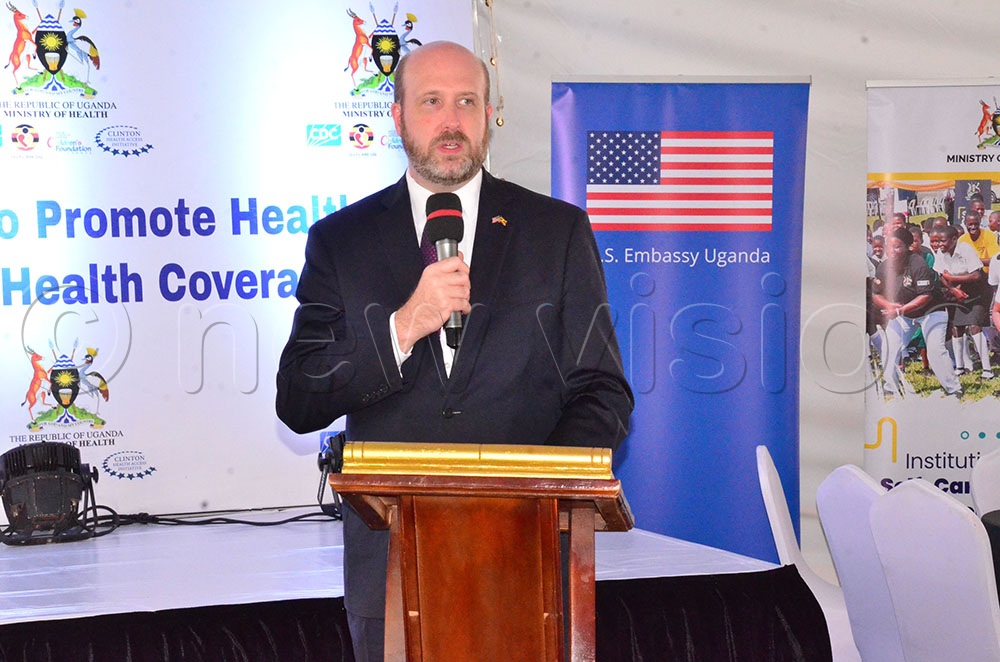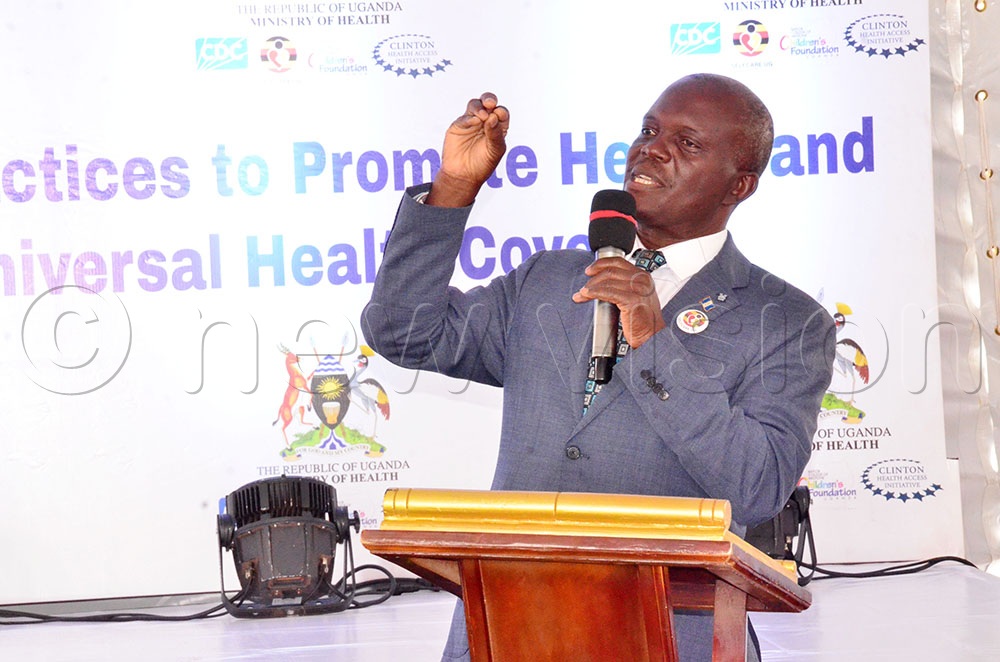Uganda unveils digital tool easing access to health information
The Self-Care App server is now active on Google Play Store, waiting to be uploaded to the Ministry of Health call centre for individuals who call in to receive feedback and relevant information.
HE US Ambassador to Uganda William W. Popp with other officials after the launch of the Self Care App at the ministry officers. MOH headquarters. (Credit: Agnes Kyotalengerire)
Government has unveiled a digital tool to help the public access health information and improve health and well-being.
Dubbed the “Self-Care App” the tool has a very broad menu, and once you click on any of the menu services, you can get detailed information, said the assistant commissioner health services- Digital Health Information management at MOH, Paul Mbaka.
The services on the menu include: Family Planning (FP), antenatal Care (ANC), HIV/STIs, Post-Abortion Care, Non-communicable Diseases such as hypertension, diabetes, mental health and sickle cell. Others include: nutrition, adolescent health and older persons & persons with disability.
The same App enhances confidentiality; through phone calls, individuals can receive and confirm relevant information.
The Self-Care App server is now active on Google Play Store, waiting to be uploaded to the Ministry of Health call centre for individuals who call in to receive feedback and relevant information.
According to Mbaka, the Self-Care App has benefits beyond the care of an individual and offers opportunity to detect clusters of health conditions or any patterns that are emerging.
“As people engage with this application, there is an opportunity to us to provide them with information and meaningfully use it to intervene quickly,” he said.
Self-care empowers individuals, families, and communities to take charge of their health. 
US Ambassador to Uganda William W Popp addresses guests during the launch of the Self care App at the health ministry headquarters. (Credit: Agnes Kyotalengerire)
According to WHO, self-care involves promoting and maintaining health, preventing disease, and coping with illness and disability with or without the support of health workers.
It is simply the practice of engaging in activities that promote and maintain one's physical, mental, emotional, and spiritual well-being.
Globally, self-care gained attention during COVID-19 after World Health Organisation (WHO) launched the self-care guidelines in 2019, and then expanded them in 2022 to cover other aspects of health.
Uganda was one of the very first countries to adopt and develop the national self-care guidelines, which were launched last year in October 2024.
The digital tool was unveiled by the United States Ambassador to Uganda, William W. Popp, during the Self-Care stakeholders’ engagement meeting at Ministry of Health headquarters in Kampala on September 19, 2025.
At the launch, Ambassador Popp said the launch of the digital tool marks a major step forward for Uganda as well as for global health security.
“As more people use this application to seek screening, testing, and preventative care, we are going to have a healthier, more resilient society,” he said.
Popp further noted that addressing health challenges early, particularly non-communicable diseases, helps to reduce the burden on health systems.
He said these innovations and accomplishments strengthen economies and support the well-being of populations in Uganda, in the United States, and around the world.
“Through these very practical, very accessible, very innovative solutions, we are demonstrating how the power of technology, the power of partnership, the power of working between the United States and Uganda can shape a healthier, more hopeful future for all,” Popp noted.

Associate Professor at Makerere School of Public Health Dr Fredrick Makumbi addressing guests during the launch of the digital Self Care App. (Credit: Agnes Kyotalengerire)
Dignitaries at the event included officials from Africa Centres for Disease Control, the Baylor Foundation Uganda, Makerere University School of Public Health and Center for Health, Human Rights and Development (CEHURD), among others.
Representing the Permanent Secretary, Kenneth Akiiri, the Under Secretary at the Ministry of Health emphasised that health security starts with empowered individuals.
“You must take responsibility for your own health, which is why the App has been developed,” Akiiri said.
He described Self-Care as a public health approach to preventing diseases, to promote well-being, to reduce unnecessary strain on our health facilities and foster a culture of shared responsibility between the health system, the individual and the community.
In his keynote address, Associate Professor at Makerere School of Public Health Dr. Fredrick Makumbi, said amidst advocacy for self-care, there is a need to equip health care providers with knowledge and skills in order to support patients.
However, Dr. Makumbi warned health care providers not to withhold information or else health care will not advance.
He also called for clear guidance operationalised to manage adolescents and young people in this digital space.
The Director General Health Services at the Health Ministry, Dr. Charles Olaro, urged the public to empower themselves by practicing self-care, which he described as self-love.
He further noted that poor health can lead to significant medical expenses. For instance, non-communicable diseases are expensive to treat and push people into poverty, consequently, resulting in missed opportunities to work and negating the value of money.
Dr. Olaro advised the public to start seeing health as an investment that requires the same level of thought, as research and financial investment.
He said that as the population invests in financial streams, they should be looking at how many strings they are investing in health, in terms of exercise and the ability to manage stress.
The paradigm shift of thinking about health as wealth will not only benefit you as an individual, but will also benefit your family, have positive implications to the society, reduce the healthcare costs and enhance the quality of life.